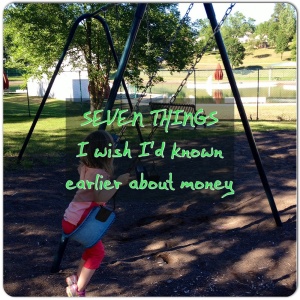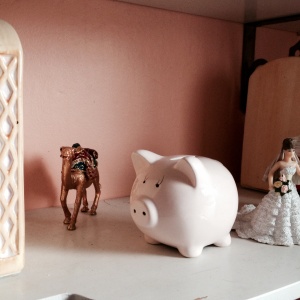The purpose of this blog is to bring some accountability to our finances, but perhaps this blog can actually help someone else avoid the mistakes we’ve made. That can only happen if I lay them out there for everyone to see. So excuse this really long post – I just want to put this out there and then move on, not make some series of posts about our mistakes. Mistakes. Plural. Yes, it’s our student loan debt that keeps me from being a stay at home mom, but that’s actually only half the story. Long ago, God provided a way out of that. But I didn’t know I even wanted it…
Growing up, we were not poor, but we were not well-off people. We never took vacations. My clothes were, at best, from Wal-Mart, and at worst, ill-fitting hand-me-downs from my larger-sized sister. We rarely spent money on having fun. When I was in high school, my dad died. My high school educated mom took on a second job to make ends meet, working all day at her full-time job and being on-call for a second job at night. Mom died when I was in college. Perhaps fearing for the provision of her children after enduring the financial hardship that came with my father’s death, she had left us her 401(k) and a few life insurance policies. The sum total would not make us rich, but for a kid in college, it was a huge windfall.
This windfall would have paid off my student loans and those of my future husband. But I had allowed myself to get into a few thousand dollars of credit card debt and my car had ceased to run properly. It would cost a lot to fix it, but it was still fixable. Those were short term needs. Once I graduated and got a job, paying of my student loans seemed like it would be easy. So in all my wisdom, I paid off the credit card debt, bought a brand new SUV, and sat on the rest of the money for awhile.
We threw ourselves a cheap wedding just over a year after my mom passed. Seriously, we did good. The only thing that could have been cheaper would have been a courthouse ceremony. We were gifted most of the expenses for our short honeymoon, so we even rocked that.

But I didn’t want to start our life together without a dresser. Seriously, who doesn’t have a dresser? And his vinyl futon had.to.go. And the entertainment center he’d fashioned himself was not working for me. So we bought a dining room table, leather couch (pre-vegan days), mahogany entertainment center and coffee table, and queen bedroom set (with a pricey Temperpedic mattress). All new.
Within four months, I got a job that moved us from Florida to Tennessee. I failed to negotiate for relocation expenses, believing they would have offered if that was an available benefit. So we paid out of pocket for professional movers to move all our nice, new, heavy furniture.
Once in Tennessee, we still had around half our windfall. We used almost all of that as a large downpayment on a house (that was probably too expensive for us). It was a huge house, so of course we needed more furniture. And the large yard required brand new lawn equipment. Whatever we held out from the downpayment got sucked into more stuff for our house.

We sold the house in 18 months in order for me to take a dream job at NASA in Houston, TX. Of course, we didn’t make any money in the sell because we hadn’t paid much principle, given the timeframe and the fact that we had an ill-advised balloon mortgage. In Houston, we rented for awhile and eventually bought a smaller, less expensive home with only a 20% downpayment. We used most of our leftover money to purchase a slightly used vehicle to replace hubby’s aging bachelor sports car. At least we wouldn’t have a car payment, but we didn’t take action to start saving for our next vehicle.

After a little over four years in our home, we were preparing to move for my husband’s career and recognized the house might not sell as quickly given the state of our floors. So we used any money we had left (and borrowed quite a bit) to redo the flooring, which was a strategic move just to sell the house quickly – not to make money – because until the house sold, we’d have two housing payments. The two housing payments would kill us.

While hubby was in the north at his new job, I ran to the grocery store to buy my daughter’s speciality milk. My debit card was declined. I sobbed. My hubby arranged to wire me some money the next day. We weren’t even tracking our balances, even though we knew these two living expenses would get us!!! We made it, but it was a stressful, nerve-wracking, depressing time. The house sold, but we didn’t make money if you included the flooring upgrades, although we accepted an offer within three weeks. Maybe the new floors were worth it.
In our new location, no one rents houses to dog owners. And few rent apartments to dog owners. So rather than looking for the cheapest place, we looked for any place that would let us keep our aging pets. We felt as if they were too old to rehome compassionately.
We ended up in an expensive but rundown townhome, so when we bought a home, even with our meager 15% downpayment, the mortgage+taxes+insurance was less than our townhome rent.

Looking back, the smartest thing to do would have been to pay off debt. Live like other newlyweds do – with mismatched furniture in a small house with vehicles that barely run. Because, had we done that, I’d be staying home now with my children.
Instead, my furniture is scratched up, coming apart, and in some cases, doesn’t even fit in my house anymore. That SUV I bought in Florida was rear wheel drive. When we bought our house here (in the very, very north), it couldn’t drive anywhere due to the icy hills. We couldn’t manage to get it parked in our driveway and got a ticket for parking on the road. We had to sell it and buy a vehicle with a payment. Our houses have gotten smaller and smaller and smaller.

We live a happy life. We are mostly healthy. We have two beautiful girls. We are incredibly blessed to have this life. I don’t want to live in the past. But here are takeaways from my story:
- Don’t use student loans. You may think you will make some huge salary, but even if you do, when it all goes to student loans, what does that matter? With your great salary, if you can’t take a vacation or afford a house, will you still think those loans were worth it? If you graduate and decide you hate your chosen career (I hear this too often), you might end up in a low-paying job you love, but doesn’t pay enough to cover those loans. Or perhaps worse yet, you are stuck in a job that you detest, just to make ends meet.
- Live on a budget that reflects your current salary but has room to save. You should be forecasting needs for the next 5+ years and making sure your budget supports that. Are you saving for a new vehicle if yours is older? Think your couch will give out or you’ll need a new roof on the house? Plan to have kids? You cannot plan for everything, but try to hit the high notes.
- Don’t buy a house until you know you want to stay in the area for a while. We knew this and every. single. time we go ahead and buy a house and lose money in the process. Three times now. Shame on us.
- If you are moving for a job, negotiate the best relocation package you can. Consider the cost of movers, closing on your home, house hunting trips, and all the set up costs you will have in your new area. Moving without a relocation package is probably a bad call, but I’m sure exceptions exist. Don’t fool yourself into thinking you are one of them – seek wise counsel before taking the leap.
- Don’t buy new just to have it new. Other than a home, just about anything you buy new will decrease in value quickly, so if you try to sell it, you won’t make back what you paid in. A slightly used vehicle will have a substantial reduction in cost. One that is a few years old is an even better deal. Electronics, appliances, clothes all fall into this category, but especially furniture. Do not buy new furniture if you plan to move soon (every move will damage it a little and your furniture may not even fit in your new place). If you plan on having kids, know your kids will rip, tear, scratch, stain, vomit on, and pee and poop on your furniture. Might as well buy something that might be a little beat up already that doesn’t come with a hefty price tag.
- Do not spend any windfalls until you have a very clear plan for what to do. I recommend reading up on Dave Ramsey’s 7 baby steps to financial freedom or Steve Diggs’ 10 stones. Had we followed either set of steps, we would have had our loans paid off years ago, with a small emergency fund on the side. It would have taken us no time to save a nice downpayment for a home without student loan payments.
- Understand that careers are not everything. You have to know that I was raised with the expectation to go to college and have a career. My mother worked (because she had to) and I had no understanding of the career woman vs. the stay-at-home mom. I assumed all women worked and had no counseling that I might want to prepare for a different life, so I never did. It wasn’t until I was about six months pregnant with our first child that it even occurred to me that I’d like to stay home – far too late for such a serious course correction. Teach your daughters to be independent and able to take care of themselves in case they have to (see the point about my high school educated mom working two jobs after her husband passed). But make sure they know there’s a very important career that they’d be wise to prepare for whether they have a “side” career or not. Tell them being a mom could possibly be the best thing the could ever aspire to be. But this isn’t just for mothers of girls. Oh no. My husband’s mother had to stay home for a time and was miserable. I think that’s why no thought was given to “what if Brian marries one day and his wife wants to stay home?” Nope, he was sent off to school and told to borrow everything he needed – to the tune of 100k for a career that starts of paying less than 20k a year. Mothers of boys: teach your sons to prepare for a wife who might want to stay home (even if she initially scoffs at the idea).
Know this: God provides. Despite all our failings with what He has blessed us, He has always seen us through. I’ve confessed my sins to Him (and you!) and I know that my loving, compassionate God has forgiven me. I kinda think that, as I learn to do better, that God will challenge me to do even better; I will grow and He will stretch me. My challenges are not over, which is probably all the more reason to continue this blog.
I say all this to say that it’s not that God hasn’t called me to be home with my children. I think He has. He has not blocked my path – I did. But can He still help me get to where I should be? Absolutely! But it may a long, winding, backroad that I have to take now. I’m not looking back.







